|
|
|
|
Live on the homepage now!
Reader Supported News
The Senate changed the rules to protect the economy. How about democracy?
I come to the floor today after a long week of wrestling with my conscience. Before we left Washington last week, we in this chamber made a change in the Senate's rules in order to push forward something that all of us think is important. We set the stage to raise the nation's debt ceiling, and yet as we cast that vote to begin addressing the debt ceiling, this same chamber is allowing the ceiling of our democracy to crash in around us.
We could not imagine changing the rules. That is, until last week. Because last week we did exactly that. Be very clear, last week we changed the rules of the Senate. To address another important issue, the economy. This is a step, a change in the Senate rules we haven't been willing to take to save our broken democracy, but one that a bipartisan majority of this chamber thought was necessary in order to keep our economy strong. We changed the rules to protect the full faith and credit of the United States government. We've decided we must do it for the economy, but not for the democracy.
So, Madam President, I will be honest, this has been a difficult week for me as I've pondered how am I going to vote on this debt ceiling question we're about to take. I feel like I'm being asked to take a road that is a point of moral dissonance for me. Because while I deeply believe that both our democracy and our economy are important, I believe that it is misplaced to change the Senate rules only for the benefit of the economy when the warning lights on our democracy are flashing at the same time. I happen to believe that our democracy is at least as important as the economy.
The Democratic quasi-majority in the Senate was able to finesse the filibuster in order to act alone to increase the debt ceiling, a rusty accounting gimmick first installed during World War I. They were able to hold their quasi-majority for that. But voting rights, the most fundamental of all Democratic fundamentals, have to be sacrificed to a parliamentary furball that the Senate refuses to cough up. Warnock was very quick to point out the problem here.
I believe that we Democrats can figure out how to get this done, even if that requires a change in the rules which we established just last week that we can do when the issue is important enough. Well, the people of Georgia and across the country are saying that voting rights are important enough. I think that voting rights are important enough. And so we cannot delay. We must continue to urge the party of Lincoln not to give in to the very forces of voter suppression that Dr. King described in that 1957 speech while standing in the shadow of Lincoln.
But even as we do that, we cannot wait. We cannot wait on them. With uncanny and eerie relevance, Dr. King's words summoned us to this very moment. He said the hour is late. The clock of destiny is ticking out, and we must act now before it is too late.
In the bright lights that currently are illuminating what was behind the coup attempt on January 6, a very bright, hot beam is reaching into the Senate on this issue. The coup and the state laws passed subsequent to it are of the same poisonous source: a deeply twisted concept of vandal-politics that is now inextricably entwined with American conservatism and, therefore, the Republican Party that is its political vehicle. It already is too close to winning out and, if Congress adjourns without acting on voter suppression, it will nearly be there.
 Supporters attend a rally for President Donald Trump at the Kenosha Regional Airport on November 2, 2020, in Kenosha, Wisconsin. (photo: Joshua Lott/Washington Post)
Supporters attend a rally for President Donald Trump at the Kenosha Regional Airport on November 2, 2020, in Kenosha, Wisconsin. (photo: Joshua Lott/Washington Post)
ALSO SEE: Trump Supporters Are Preparing for a Post-Democratic Future
Another worked as a deputy in the White House Presidential Personnel Office, which was known for weeding out people perceived as disloyal to President Donald Trump.
A third is an Arkansas lawyer who represented Trump’s campaign during last year’s Wisconsin recount, a process that confirmed President Biden won the key swing state by roughly 20,700 votes.
All are being paid with Wisconsin taxpayer money as part of a legislative-backed investigation into the 2020 results headed by a former state Supreme Court justice that has picked up steam in recent weeks. The inquiry, the latest gambit by Republicans to reexamine the 2020 election nationally, makes little pretense of neutrality and is being led by figures who have shown allegiance to Trump or embraced false claims of fraud.
The former president personally lobbied state lawmakers to pursue the Wisconsin investigation and spurred on other ballot reviews around the country, leaning on legislators to revisit the vote more than a year after Americans went to the polls.
In Wisconsin, a state that is likely to see some of the nation’s most competitive races in 2022 for governor and U.S. Senate, there are now multiple efforts underway to scrutinize how the last election was run, including a recommendation by a county sheriff to prosecute and jail state election officials.
“What we’re seeing in Wisconsin is a whole bunch of little brush fires, each one of which could be dismissed as minor, unconcerning or maybe even absurdly comical,” said Jeffrey Mandell, an expert in Wisconsin election law and attorney for the Democratic mayor of Green Bay, who is fighting a subpoena from the legislative inquiry. “My concern is there are enough brush fires that they could feed into each other and form a real conflagration.”
The danger, he said, is that the same players could challenge the outcome of a closely contested midterm election — potentially with control of the U.S. Senate in the balance — and that the institutions designed to certify the results will have been dismantled or disempowered.
“It would be a crisis,” Mandell said. “People haven’t been paying attention because there are bigger fires elsewhere. But there aren’t more fires anywhere.”
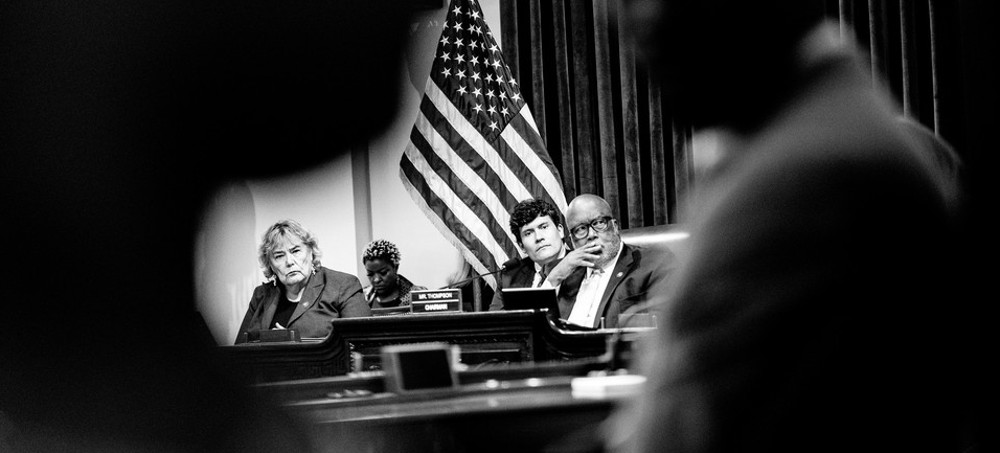 The House select committee probing the January 6 insurrection has released fresh details of the elaborate plot to subvert the certification of President Joe Biden's election. (photo: Stefani Reynolds/Getty)
The House select committee probing the January 6 insurrection has released fresh details of the elaborate plot to subvert the certification of President Joe Biden's election. (photo: Stefani Reynolds/Getty)
But it is the ex-President's greatest, most subversive victory that his empire of falsehoods will surely survive new disclosures that lay bare his own abuses of power and the voter-mocking deceit of his political and media enablers.
While there has already been a steady accumulation of shocking evidence of Trump's coup attempt on January 6 and the emptiness of his election fraud claims, recent days put the saga into a horrifying new light. They brought the clearest indicators yet that the entire Make America Great Again infrastructure and Trump's potential next White House campaign rest on hogwash and the whitewashing of history.
The House select committee probing the January 6 insurrection has released fresh details of the elaborate behind-the-scenes plot to subvert the certification of President Joe Biden's election. There's embarrassing new evidence of how conservative media stars were privately alarmed by the attack by Trump's mob but quickly reverted to amplifying his lies to millions of Americans they willfully deceived. And a major new Associated Press survey of 2020 swing states contested by Trump found cases of voter fraud were sparse and far from the nationwide conspiracy he claims. There are separate reports that three Florida residents were recently arrested and charged with election fraud -- two of whom were registered Republicans.
This week will be remembered for Republican Rep. Liz Cheney of Wyoming, the vice chair of the House committee, bringing receipts that exposed the hypocrisy of Trump's extended orbit.
Texts from Republican lawmakers, Trump's son Donald Trump Jr. and Fox News prime-time anchors to then-White House chief of staff Mark Meadows show that they knew the attack on the Capitol was a disaster and wanted it to stop.
Yet those same conservative heroes are part of a political media operation that spent the last 11 months obscuring what really happened, in many cases denying the truth of Biden's election win and fueling lies about voter fraud that are feeding anti-democratic extremism. All to preserve a meal ticket named Trump.
In another development fraught with chilling implications, the committee revealed that Meadows wrote in an email that the National Guard would be present to "protect pro Trump people" on January 6. It was the latest example of a habit of weaponizing sacred American institutions for Trump's political gain.
The former President, meanwhile, encapsulated perverted political values that now rule much of the Republican Party and will likely produce its next presidential nominee. He recently declared that former Vice President Mike Pence had been "mortally wounded" because he had refused to steal the election during his ceremonial role in certifying Biden's victory. The ex-President was giving voice to a GOP incentive system that now rewards coup attempts and despotic behavior over honoring the Constitution.
The scale of the evidence coming to light this week is remarkable. But daily bombshells about what happened on January 6 often have the effect of diminishing the shock value of Trump-related outrages. And voters have pressing concerns like the rising cost of living and a pandemic that will shortly drag into a third year. Yet this week's developments are important not just because they chart the staggering breadth of Trump's election conspiracy. They are also exposing the lies on which his future political prospects are built -- and on which multiple Republican-run states have passed laws that make it harder to vote and easier to steal future elections.
Trump's biggest confidence trick
There has always been an aura of a con man about Trump, from his days as a bankruptcy-plagued real estate chancer who adopted a persona as the master of the art of the deal. His presidency opened with false claims about the size of his inauguration crowd that in retrospect augured an administration constructed on untruths -- or what his former senior aide Kellyanne Conway once dubbed "alternative facts."
It is now clear that his big lie that "frankly, we did win this election" is the most audacious and damaging confidence trick of his career.
A few Trump supporters are seeing the light, including Dustin Stockton, one of the organizers of the January 6 rally that preceded the insurrection, who found himself subpoenaed by the House committee -- and lacks the means to wage a legal battle like Trump's wealthy political guru Steve Bannon.
"Essentially, he abandons people when the going gets tough for people. And, you know, in some ways, it's embarrassing to think that in a lot of ways, we bought into what essentially turned out to be a bluff or a con," Stockton told CNN's Anderson Cooper on Tuesday.
Yet Stockton is an outlier. Trump's popularity among Republican voters makes him the preemptive favorite for the GOP's 2024 nomination. He has the power to shape the political careers of those willing to accept his extremism -- as his raft of endorsements of midterm election candidates, nationally and in the states, shows. The Trump story, meanwhile, makes millions for conservative media outlets and stars -- giving them an incentive to promote a false alternative reality that has won over legions of viewers.
The mendacity of the conservative media propaganda machine was exposed by Cheney's reading aloud of texts sent to Meadows by several Fox News powerhouses, including Laura Ingraham and Sean Hannity, pleading with Meadows to get Trump to intervene on January 6.
"Mark, the president needs to tell people in the Capitol to go home," Ingraham texted. "This is hurting all of us. He is destroying his legacy." Hannity asked the-then chief of staff whether Trump could make a statement that would tell the people at the Capitol to leave.
Both anchors later condemned the violence on January 6. But they have been among Fox News personalities who attack the investigation as a political vendetta against Trump rather than a probe into one of the worst assaults on democracy in American political history. And television disinformation is only a small part of the problem; social media networks teem with falsehoods about the election and boost Trump's lies in what is almost a fact-free zone.
Trump's Orwellian method
Trump's enablers have reacted to the disclosures of recent days by adopting the signature move of their leader -- spinning a false reality to excuse his behavior and mislead his supporters about what really happened.
Meadows, for instance, appeared on Hannity's show on Monday and concocted a story that contradicts reports that the former President had cooled his heels and watched on TV as his rioting supporters marauded through the Capitol.
"At the end of the day, they're going to find that not only did the President act, but he acted quickly," Meadows said. The former chief of staff has since been cited for criminal contempt by the House for refusing a subpoena to testify to the committee. His tactic was familiar from previous Trump scandals, as he pivoted away from the truth to create a more palatable tale for Trump supporters that absolved the ex-President of culpability.
The approach recalled Trump's own when his pressure on Ukrainian President Volodymr Zelensky to open an investigation into then-candidate Biden and his son Hunter came out. The ex-President simply insisted that their call was "perfect," even though a White House transcript showed repeated abuses of power as he used military aid as a carrot -- a transgression that led to his first impeachment.
This Trump gambit -- also used by conservative news outlets every day -- recalls the party's reality-defying "War is Peace" slogan in George Orwell's novel "Nineteen Eighty-Four." Trump explained his method in a less literal way in 2018 when instructing followers to distrust their own eyes and non-partisan media and to believe only him. "What you're seeing and what you're reading is not what's happening," he said.
This week's revelations have been damning for Trump, his former aides and the conservative media propagandists who sustain him.
But if history is any guide, the truth will not bring him down.
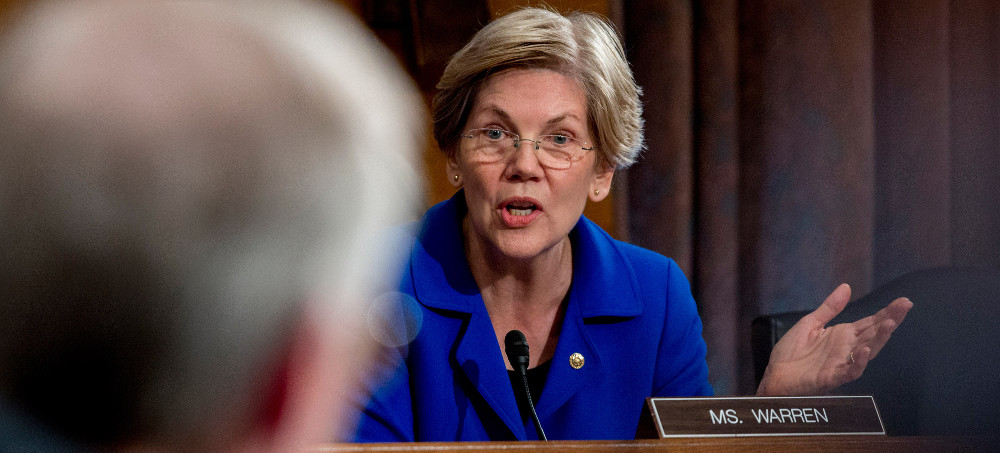 Sen. Elizabeth Warren has called for adding 4 Supreme Court Justices. (photo: Andrew Harrer/Getty)
Sen. Elizabeth Warren has called for adding 4 Supreme Court Justices. (photo: Andrew Harrer/Getty)
"I believe it's time for Congress to yet again use its constitutional authority to expand the number of justices on the Supreme Court," the Massachusetts Democrat she wrote in a Boston Globe op-ed. "I don't come to this conclusion lightly or because I disagree with a particular decision; I come to this conclusion because I believe the current court threatens the democratic foundations of our nation."
Warren said that adding more justices would help "rebalance" the court, which she claims in recent years has undermined its legitimacy and independence because of a slew of "radical right-wing" decisions, particularly concerning voting rights, labor unions, and corporate power.
"This radical court has reversed century-old campaign-finance restrictions, opening the floodgates for corporations to spend unlimited sums of money to buy our elections. It has reversed well-settled law that once required employers to permit union organizers to meet with workers," Warren wrote. "And it has gutted one of the most important civil rights laws of our time, the Voting Rights Act, not once but twice."
The progressive lawmaker also called out Senate Minority Leader Mitch McConnell, the highest-ranking Republican senator, for refusing to consider former President Barack Obama's Supreme Court nominee, Merrick Garland, to replace the late Justice Antonin Scalia in 2016, nine months before the presidential election, but then four years later, swiftly confirming former President Donald Trump's pick, Amy Coney Barrett, eight days before the 2020 election.
McConnell, who was Senate majority leader in 2016, has repeatedly defended his decision to block Garland's nomination, arguing that the last time the opposite party of a president confirmed a new Supreme Court justice in a presidential election year was in 1888.
As for what happened in 2020, McConnell said because both the White House and Senate were controlled by Republicans, they could move forth with a Supreme Court vacancy in a presidential election year. In his one term in office, Trump appointed three justices to the bench: Barrett in 2020, Brett Kavanaugh in 2018, and Neil Gorsuch — Scalia's replacement — in 2017.
Warren blasted the move in her op-ed as "Republican court-packing" and "Republican hijacking of the Supreme Court."
"To restore balance and integrity to a broken institution, Congress must expand the Supreme Court by four or more seats," Warren wrote.
The senator also cited recent low public approval ratings the court has received as a reason to push for reform. A new Quinnipiac University poll last month found that more than 6 in 10 Americans say the Supreme Court is motivated primarily by politics.
"Rebalancing the court is a necessary step to restore its credibility as an independent institution, one that works for the American people and not just for the wealthy and the powerful," Warren wrote.
Warren tied her stance to the possibility that the Supreme Court may overturn abortion rights guaranteed nearly 50 years ago in the landmark ruling, Roe v. Wade. The Supreme Court is set to make a decision to that major abortion challenge by next June.
"Without reform, the court's 6-3 conservative supermajority will continue to threaten basic liberties for decades to come," Warren wrote.
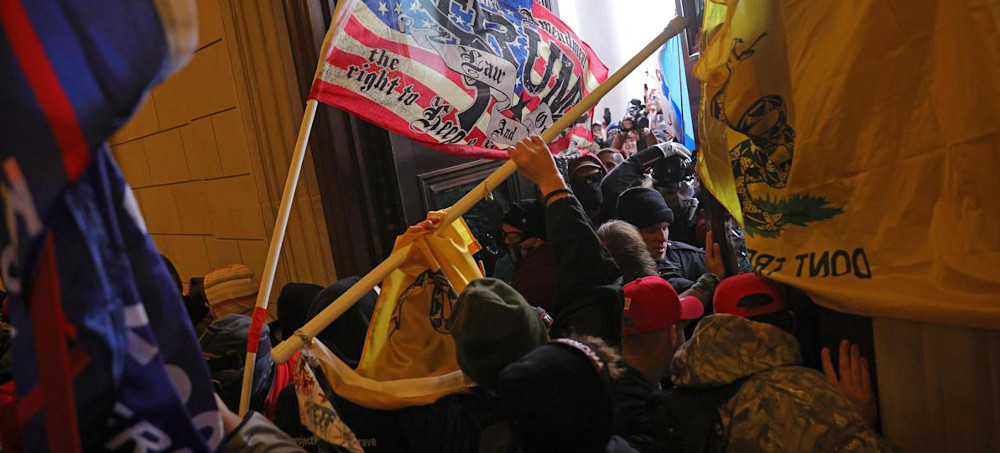 Companies have quietly begun to ramp up their donations to Republican election objectors once again. (photo: Getty)
Companies have quietly begun to ramp up their donations to Republican election objectors once again. (photo: Getty)
As a consequence, a number of major companies and associated trade groups announced that they would halt political donations to the congressmen and senators who objected to Biden's election win, or said they would stop giving money to political candidates altogether.
In January, donations to these objectors from Fortune 500 companies and related trade groups was nearly $0, and in February it rose only slightly to $28,000 in total, according to a tracker created by nonpartisan watchdog group Accountable.us, a watchdog group.
But companies have quietly begun to ramp up their donations to election objectors once again, according to a new analysis by Accountable.us. Fortune 500 companies and industry groups donated more than $725,000 to members of Congress who opposed 2020 election results in October alone, bringing the 2021 total to more than $6.8 million.
The top donors to election objectors since January 2021 were: CULAC, the political action committee (PAC) of Credit Union National Association which gave $176,500, The American Bankers Association PAC (BANKPAC) which gave $164,500, General Dynamics which gave $161,500, the National Automobile Dealers Association Political Action Committee which gave $160,000, and Raytheon Technologies, which gave $159,500, according to Accountable.us.
House Republican leader Kevin McCarthy received the most donations from these groups of any lawmaker who voted against certifying the election results, receiving $261,000 this year. He publicly opposes Congress’s ongoing investigation into the Jan. 6 insurrection. Steve Scalise (R-La.) was second with $206,500, Sam Graves (R-Mo.) came in third with 193,252, Glenn Thompson (R-PA) was next with $172,900, and Blaine Luetkemeyer (R-Mo.) came in fifth with $163,000.
McCarthy eventually said he did not oppose Biden’s presidency in October of 2021, but he did seed doubts. In an official statement after the insurrection he wrote: “Since Election Day, millions of Americans have shared concerns about the integrity of our nation’s electoral process. Congress has the responsibility to listen to these concerns to help heal our nation, investigate, and work with states to make necessary reforms to our electoral process, particularly when its integrity comes into question.”
Prior to the Jan. 6 insurgency this year, about 280 Fortune 500 companies had supported Republican Congress members who objected to the election results that verified President Joe Biden’s presidential win. At least 124 of those companies suspended donations as a direct result of the riots, according to a CNN survey.
"We will not support candidates who do not support the law," Citi head of global government affairs Candi Wolff told staff in an internal memo after the riots, according to media reports. Citi suspended all donations to their political action committee. JPMorgan, the biggest U.S. bank by assets, and Goldman Sachs also suspended PAC donations to all candidates.
AT…T, which donated $764,000 to candidates during the 2019-2020 election cycle who objected to election results, announced it would suspend donations to those who did not agree that Biden was fairly elected president. The decision was made by employees who were on the company’s PAC board.
While it’s illegal for companies to donate directly to political candidates, they can create funds known as PACs, to pool voluntary employee donations of up to $5,000 per candidate each election cycle. Corporations pay for some of the operating costs of these funds. Trade groups and lobbyists who support industries also often make large contributions to political efforts through PACs.
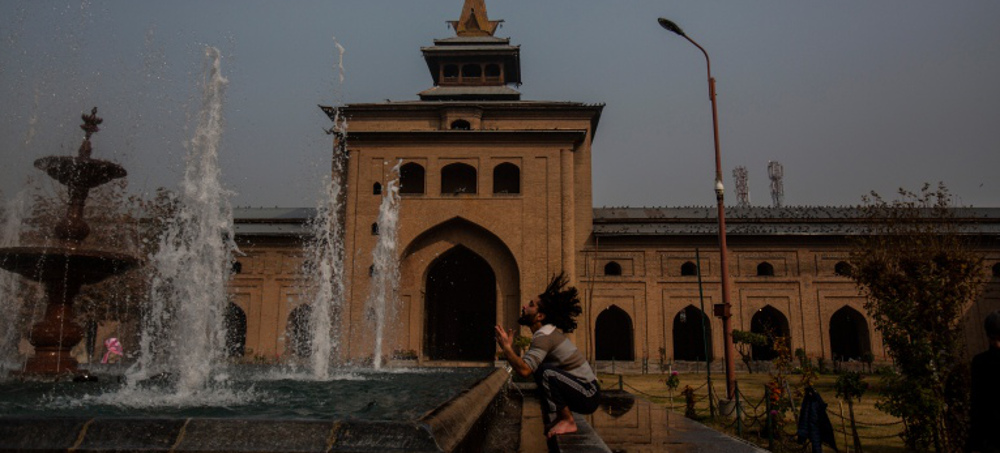 A Kashmiri man performs ablution before prayers outside the Jamia Masjid, or the grand mosque in Srinagar, Indian-administered Kashmir. (photo: Mukhtar Khan/AP)
A Kashmiri man performs ablution before prayers outside the Jamia Masjid, or the grand mosque in Srinagar, Indian-administered Kashmir. (photo: Mukhtar Khan/AP)
But Indian authorities see the mosque as a trouble spot — a nerve center for protests and clashes that challenge India's sovereignty over the disputed Kashmir region.
For Kashmiri Muslims it is a sacred venue for Friday prayers and a place they can raise their voices for political rights.
In this bitter dispute, the mosque in Kashmir's main city has largely remained closed for the past two years. The mosque's chief priest has been detained in his home almost nonstop throughout that time, and the mosque's main gate is padlocked and blocked with corrugated tin sheets on Fridays.
The closure of the mosque, which is revered by Kashmir's mostly Muslim population, has deepened their anger.
"There is a constant feeling that something is missing in my life," said Bashir Ahmed, 65, a retired government employee who has offered prayers at the mosque over five decades.
Indian authorities refused to comment on the mosque restrictions despite repeated queries from The Associated Press. In the past, officials have said the government was forced to close the mosque because its management committee was unable to stop anti-India protests on the premises.
The shutting of the 600-year-old mosque came amid a clampdown that began in 2019 after the government stripped Kashmir of its long-held semiautonomous status.
In the past two years, some of the region's other mosques and shrines — also closed for months due to the security crackdown and the subsequent pandemic — have been allowed to offer religious services.
Jamia Masjid has remained out of bounds to worshippers for prayers on Friday – the main day of congregational worship in Islam. Authorities allow the mosque to remain open the other six days, but only a few hundred worshippers assemble there on those occasions, compared to the tens of thousands that often gathered on Fridays.
"This is the central mosque where our ancestors, scholars and spiritual masters have prayed and meditated for centuries," said Altaf Ahmad Bhat, one of the officials at the grand mosque.
He dismissed the law-and-order reasons cited by the authorities as "absurd," adding that discussions about social, economic and political issues affecting Muslims were a core religious function of any grand mosque.
The grand mosque is mainly reserved for mandatory Friday congregational prayers and special services. Obligatory daily prayers are usually held in smaller neighborhood mosques.
For the region's Muslims, the mosque's closure brings painful memories of the past. In 1819, Sikh rulers closed it for 21 years. Over the past 15 years, it has been subject to periodic bans and lockdowns by successive Indian governments.
But the current restrictions are the most severe since the region was divided between India and Pakistan after the two nations gained independence from British colonialism in 1947. Both claim the Himalayan territory in its entirety.
The Indian government initially grappled with largely peaceful public protests seeking a united Kashmir, either under Pakistani rule or as an independent entity. But a crackdown on dissent led to Kashmir's eruption into an armed rebellion against India in 1989. India has depicted the insurgency as Pakistan-sponsored terrorism, a charge Pakistan has denied.
Indian forces largely crushed the rebellion about 10 years ago, though popular demands for "Azadi," or freedom, remained ingrained in the Kashmiri psyche.
The region made a transition from the armed struggle to unarmed uprisings, with tens of thousands of civilians repeatedly taking to the streets to protest Indian rule, often leading to deadly clashes between stone-throwing residents and Indian troops. The grand mosque and its surrounding areas in Srinagar's heart emerged as central to these protests.
Sermons at the Jamia Masjid would often address the long-simmering conflict, with Mirwaiz Umar Farooq, the chief priest and one of the region's top separatist leaders, giving fiery speeches highlighting Kashmir's political struggle.
Authorities often clamped down, banning prayers at the mosque for extended periods. According to official data, the mosque was closed for at least 250 days in 2008, 2010 and 2016 combined.
The armed conflict again intensified after Prime Minister Narendra Modi came to power in 2014 and won a landslide re-election in 2019. Modi's Hindu nationalist Bharatiya Janata Party-led government toughened its stance both against Pakistan and Kashmiri separatists amid rising attacks by Hindu hard-liners against minorities in India, further deepening frustrations among Kashmir's Muslims.
Soon a new wave of rebels revived Kashmir's militancy and challenged India's rule with guns and effective use of social media. India responded with sometimes deadly counterinsurgency operations.
Freedom of religion is enshrined in India's constitution, allowing citizens to follow and freely practice religion. The constitution also says the state will not "discriminate, patronize or meddle in the profession of any religion."
But even before the current security operation in Kashmir, experts say conditions for India's Muslims under Modi have worsened.
In Kashmir, the clampdown on the most revered mosque has aggravated these fears.
"Jamia Masjid represents the soul of Kashmiri Muslims' faith and has remained at the center of demands for social and political rights since its foundation some six centuries back," said Zareef Ahmed Zareef, a poet and an oral historian. "Its closure is an attack on our faith."
On special occasions like the last Friday in the fasting month of Ramadan, hundreds of thousands of faithful pray in the mosque, filling its neighborhood's winding lanes and roads.
For the last two years, such scenes have remained missing. Muslims say the gag is undermining their constitutional right to religious freedom.
Ahmed, the worshipper, on a recent Saturday afternoon sat inside the mosque, a wood and brick architectural marvel with 378 wooden pillars. He said he has never seen the mosque shut and desolate for such an extended period.
"I feel deprived and violated," Ahmed said as he raised his hands in supplication. "We have been subjected to extreme spiritual suffering."
Many Kashmiri Muslims have long said New Delhi curbs their religious freedom on the pretext of law and order while promoting and patronizing the annual Hindu pilgrimage to an icy Himalayan cave visited by hundreds of thousands of Hindus from across India.
The Amarnath pilgrimage lasts for nearly two months, although it was canceled for the last two years due to the pandemic.
On a recent Friday, as the mosque remained closed, its sprawling marketplace, an otherwise vibrant and bustling neighborhood, wore a deserted look.
Babull, a mentally challenged man in his 40s who inhabits the place in and around the grand mosque, whirled around the neighborhood. He cautioned shopkeepers of imminent danger from police raiding the place, as they have done in the past.
Nearby, a gaggle of Indian tourists went about clicking selfies in the backdrop of the mosque's barricaded and locked main gate.
Kashmiri onlookers watched them in silence.
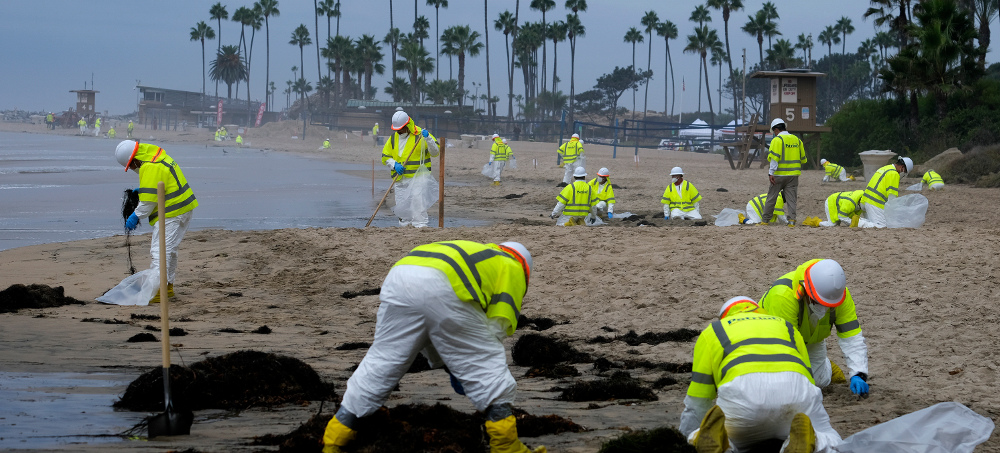 Workers in protective suits clean the contaminated beach in Corona Del Mar after an oil spill in Newport Beach, California, in October 2021. (photo: Ringo H. W. Chiu/AP)
Workers in protective suits clean the contaminated beach in Corona Del Mar after an oil spill in Newport Beach, California, in October 2021. (photo: Ringo H. W. Chiu/AP)
Amplify Energy Corp. and its companies that operate several oil rigs and a pipeline off Long Beach were charged by a federal grand jury with a single misdemeanor count of illegally discharging oil.
Investigators believe the pipeline was weakened when a cargo ship's anchor snagged it in high winds in January, months before it ultimately ruptured Oct. 1, spilling up to about 25,000 gallons (94,600 liters) of crude oil in the ocean.
U.S. prosecutors said the companies were negligent six ways, including failing to respond to eight leak detection system alarms over a 13-hour period that should have alerted them to the spill and would have minimized the damage. Instead, the pipeline was shut down after each alarm and then restarted, spewing more oil into the ocean.
Amplify blamed the unnamed shipping company for displacing the pipeline and said workers on and offshore responded to what they believed were false alarms because the system wasn't functioning properly. It was signaling a potential leak at the platform where no leak was occurring, the company said.
The leak, in fact, was from a section of undersea pipe 4 miles (6.4 kilometers) miles away, Amplify said.
"Had the crew known there was an actual oil spill in the water, they would have shut down the pipeline immediately," the company said.
The Associated Press first reported last week that Amplify's leak detection system was not fully functional. At the time, the company declined to explain what that meant.
AP in October reported on questions surrounding the company's failure to respond to an alarm.
Meanwhile, the U.S. Coast Guard said Wednesday that it was responding to a report of a sheen off the coast of Bolsa Chica State Beach but hadn't determined the source and planned to fly over the scene Thursday morning.
The area is in the same general vicinity as that of the October leak, although the pipeline currently is out of service.
In that case, the first pipeline rupture alarm sounded at 4:10 p.m. Oct. 1, but the leak was not discovered until well after sunrise the next morning and reported about 9 a.m. Citizens on shore called 911 to report the strong smell of crude that first afternoon, and an anchored cargo vessel reported seeing a large sheen on the water before sunset.
Local authorities who went looking for a spill Oct. 1 didn't find it. The Coast Guard said it was too dark to go out and search for the spill by the time they received a report about it. They went out after sunrise, finding it around the time the company reported it.
Just days after the spill, Amplify CEO Martyn Willsher had refused to answer questions at news conferences about the timeline surrounding the spill and a report that an alarm at 2:30 a.m. Oct. 2 alerted controllers about a possible spill. He maintained the company didn't learn of the spill until a boat saw a sheen on the water at 8:09 a.m. that morning.
Orange County Supervisor Katrina Foley said the indictment validates residents who had detected the spill a day earlier and reported it.
"It's terrible that they basically lied to the community during the press briefings and caused people to believe that what they saw with their own eyes or smelled or knew was actually not true," she said. "What we know now is that the company knew this, and the alarms went off like they were supposed to, and nobody did anything."
Even after the eighth and final alarm sounded, the pipeline operated for nearly an hour in the early morning, prosecutors said.
Pipeline safety advocate Bill Caram said the indictment paints a picture of a reckless company.
"I understand there are false positives on leak detection systems but this is our treasured coastline," said Caram, director of the Bellingham, Washington-based Pipeline Safety Trust. "The fact that they kept hitting the snooze button and ignoring alarms, stopping and starting this pipeline and all the while leaking oil in the Pacific Ocean is reckless and egregious."
Prosecutors also found that the pipeline was understaffed and the crew was fatigued and insufficiently trained in the leak detection system.
The indictment's description of company personnel as fatigued pointed to a long-standing industry problem, said pipeline expert Ramanan Krishnamoorti with the University of Houston.
"Fatigue and overworked staff is old and trite and inexcusable," he said. "This has been demonstrated over and over again as being the single most important vulnerability."
It's not clear why it took so long for the 1/2-inch (1.25-centimeter) thick steel line to leak after the apparent anchor incident, or whether another anchor strike or other incident led to the rupture and spill.
The spill came ashore at Huntington Beach and forced about a weeklong closure of the city's beaches and others along the Orange County coast. Fishing in the affected area resumed only recently, after testing confirmed fish did not have unsafe levels of oil toxins.
If convicted, the charge carries up to five years of probation for the corporation and fines that could total millions of dollars.
Follow us on facebook and twitter!
PO Box 2043 / Citrus Heights, CA 95611
Evening Roundup, May 28...plus a special thank you to our Contrarian family Featuring Jen Rubin, Katherine Stewart, Brian O'Neill, Jenni...
